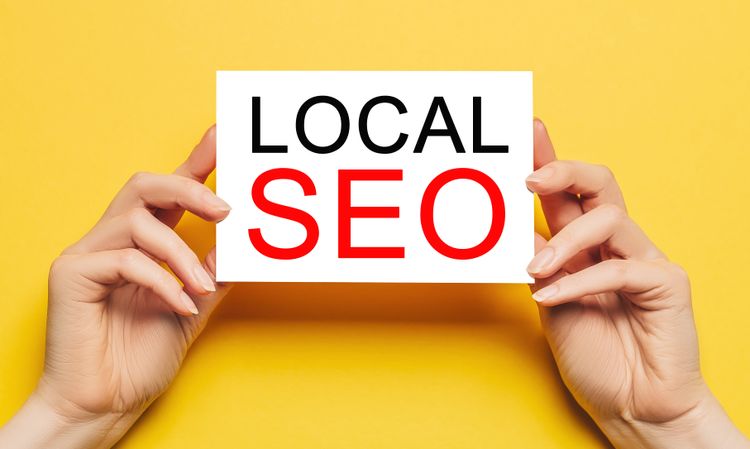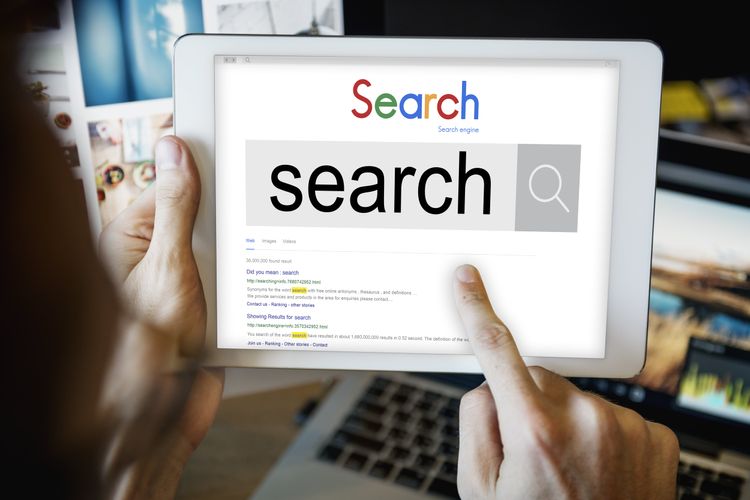In the competitive world of online marketing, making your website stand out is crucial. The way to achieve this is through Search Engine Optimisation (SEO), which involves a variety of strategies and practices designed to improve your website's visibility in search engine results pages (SERPs).
There are two main components of SEO that play a pivotal role in optimising your website: On-Page SEO and Off-Page SEO. Together, they form a comprehensive approach to SEO that covers everything from the content and structure of your website to your online reputation and authority.
In this article, we will delve into the essential elements of On-Page and Off-Page SEO, highlight their differences, and explain why you need both for a successful SEO strategy.
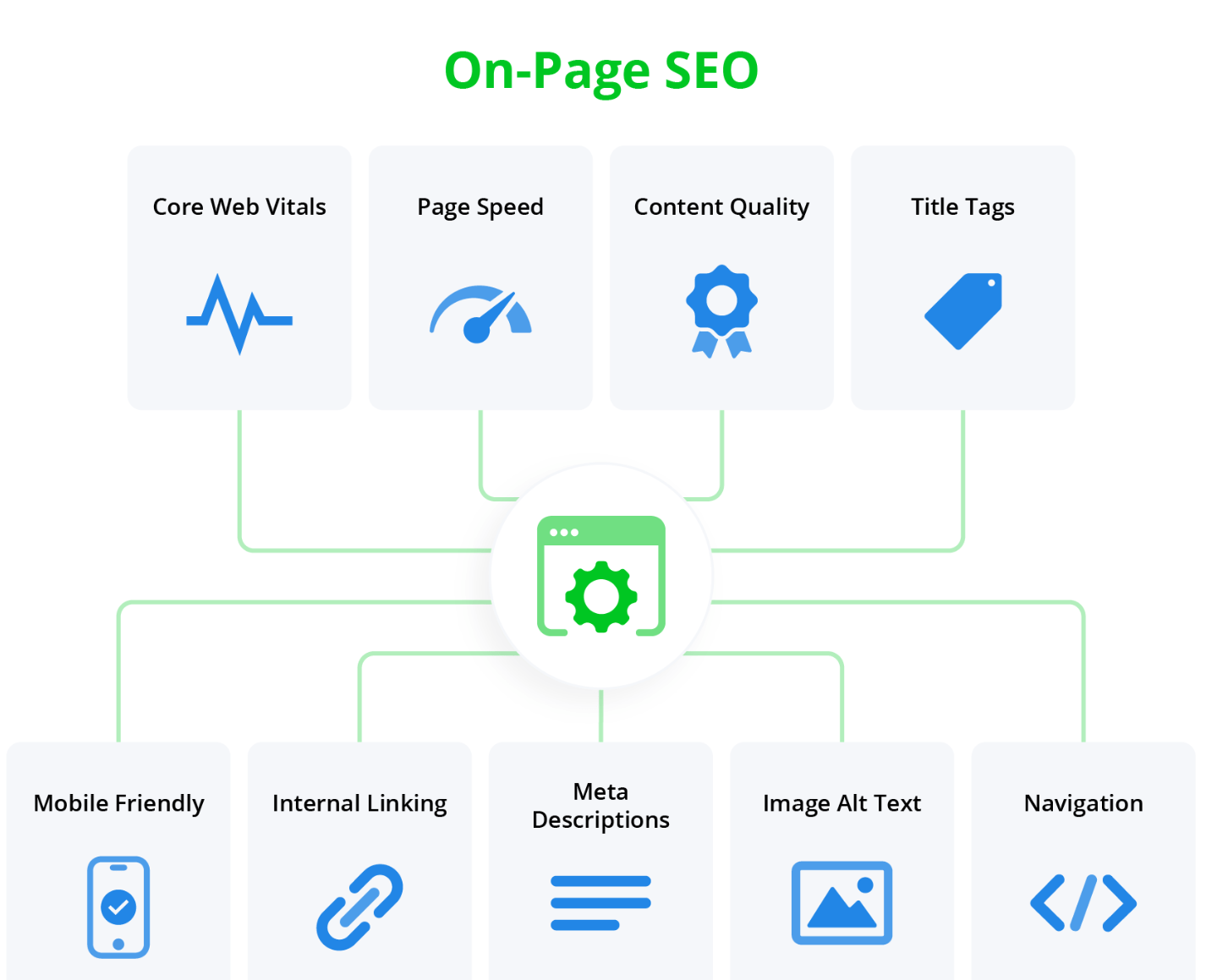
What is On-Page SEO?
On-page SEO, also known as "on-site SEO”, is the art of of optimising various elements of your website in order to improve its visibility in search engine results pages (SERPs) and enhance the overall user experience. It's all about fine-tuning different parts of your website, like the keywords you use and how your site is set up, to make it clear what your site is all about. This way, search engines, like Google, can easily understand your site and show it to people who are looking for information that you offer.
Let’s think about on-page SEO as sprucing up your online “home.” Just like you'd want your house to be welcoming for guests, on-page SEO makes sure your website is clear, easy to navigate, and enjoyable for your online visitors. This, in turn, improves your website's chances of ranking higher on the search engine results page.
On-page SEO can help you:
-
Improve Visibility: By optimising your web pages, you increase the likelihood of your content appearing on the first page of search results for relevant queries. This improved visibility drives more organic traffic to your website.
-
Enhance User Experience: On-page SEO is not just about pleasing search engines. It's also about creating a more enjoyable and valuable experience for your users. By organising your content, optimising your HTML tags, and improving your site's navigation, you provide a better overall experience for your visitors.
-
Boost Authority and Credibility: By optimising your content and providing valuable information to your users, you establish yourself as an authority in your niche. This can lead to increased trust and credibility, making it more likely for users to choose your website over competitors.
-
Increase Conversion Rates: A well-optimised website can lead to higher conversion rates. If people can find your site, enjoy their visit, and trust your content, they're more likely to take actions like signing up for your newsletter or buying a product you recommend.
On-page SEO covers both the content of your pages and the HTML source code, focusing on elements that are directly under your control.
Key On-Page SEO Factors
-
Title Tags, Meta Descriptions, and Header Tags: These elements tell both users and search engines what your page is about. A clear, concise title tag can boost your visibility in search results, while a compelling meta description can increase clicks to your page. Header tags help organise your content and make it easier to read.
-
URL Structure and Site Architecture: Your website's URLs should be simple and logical. This makes it easier for search engines to understand and index your site. A well-structured website also helps users find what they're looking for more easily.
-
Content Quality and Keyword Optimisation: Quality content is at the heart of on-page SEO. Create useful, original content that your audience will value. Also, include relevant keywords in your content so that search engines know what it's about. Optimising your content for relevant keywords helps search engines understand the topics and themes of your content, increasing the likelihood of ranking for targeted queries.
-
Image Optimisation and Alt Text: Images can enhance your content, but they can also slow down your site if they're too large. Compress your images so they load quickly, and use descriptive alt text so search engines know what they are. Using descriptive alt text for your images helps search engines understand the content of your images, making it more likely for your images to appear in image search results.
-
Internal Linking and Anchor Text: Linking to other pages on your website helps users navigate your site and discover more of your content. Use descriptive anchor text for your links so users and search engines know what the linked page is about. Internal linking also helps distribute link equity across your site, increasing the ranking potential of your pages.
-
Mobile Optimisation and Page Speed: More people are searching on mobile devices than ever before. Make sure your site looks good and works well on mobile. Also, ensure your pages load quickly, as slow-loading pages can frustrate users and hurt your rankings.
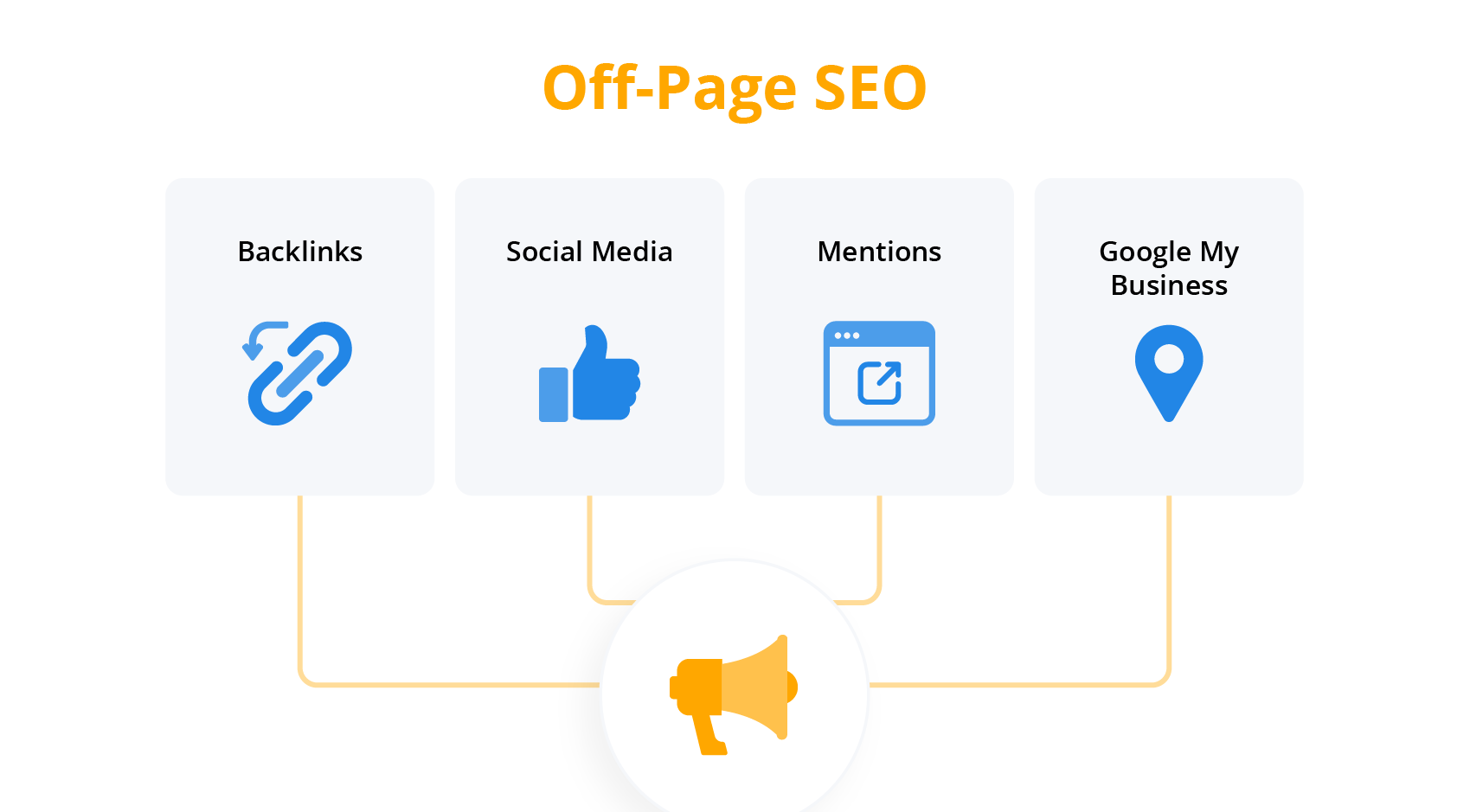
What is Off-Page SEO?
Off-page SEO refers to the actions taken outside of your website to improve its visibility and ranking in search engine results pages. Unlike on-page SEO, which focuses on optimising the elements on your website, off-page SEO is about building your website's authority, credibility, and trustworthiness through various external activities. It's like building a reputation for your website by getting other sites to give it a thumbs-up.
The main goal of off-page SEO is to show search engines that your site is trustworthy, credible, and authoritative. When other websites link to yours, it's like they're giving you a vote of confidence. The more votes you have from reputable sites, the higher your site is likely to rank in search results.
Here's why off-page SEO matters:
-
Building Trust and Authority: It can help your audience trust your content more, and search engines will consider your site as a valuable addition to the web.
-
Increasing Website Traffic: By promoting your content on various online platforms, including social media, blogs, and forums, you can attract more traffic to your site. This can lead to increased brand awareness and potentially more conversions.
-
Enhancing Online Reputation: Engaging with your audience on social media, responding to reviews, and being active on relevant online communities, helps you build a strong, positive online presence.
-
Improving Search Engine Rankings: Off-page SEO plays a big role in where your site appears in search results. The more high-quality backlinks you have, the more credible your site appears to search engines, and the higher it's likely to rank.
Key Off-Page SEO Factors
-
Backlinks and Link Quality: Backlinks are links from other websites to yours. They're like votes of confidence in your site. The more high-quality backlinks you have, the higher your site is likely to rank in search results. Quality is more important than quantity. Links from reputable, relevant sites are worth more than those from low-quality sites.
-
Social Signals and Online Reputation: Social signals are interactions on social media, like likes, shares, and comments. While they don't directly affect search rankings, they can boost your content's visibility and lead to more traffic and backlinks. A strong online reputation, built by engaging with your audience and responding to reviews, can also help your off-page SEO.
-
Brand Mentions and Authority: Even without a link, mentions of your brand on other sites can help your off-page SEO. These mentions show search engines that your brand is well-known and trusted. The more positive mentions you have, the more authoritative your site appears.
-
Guest Blogging and Content Marketing: Guest blogging means writing articles for other sites in your industry. This can help you reach a bigger audience and get valuable backlinks. Content marketing is about creating and sharing high-quality content. This can draw more traffic to your site, generate leads, and improve your off-page SEO.
-
Local SEO and Business Listings: For local businesses, local SEO is key. Creating a Google My Business listing, getting customer reviews, and making sure your business's name, address, and phone number are consistent online can boost your local search rankings. This also helps your overall off-page SEO.
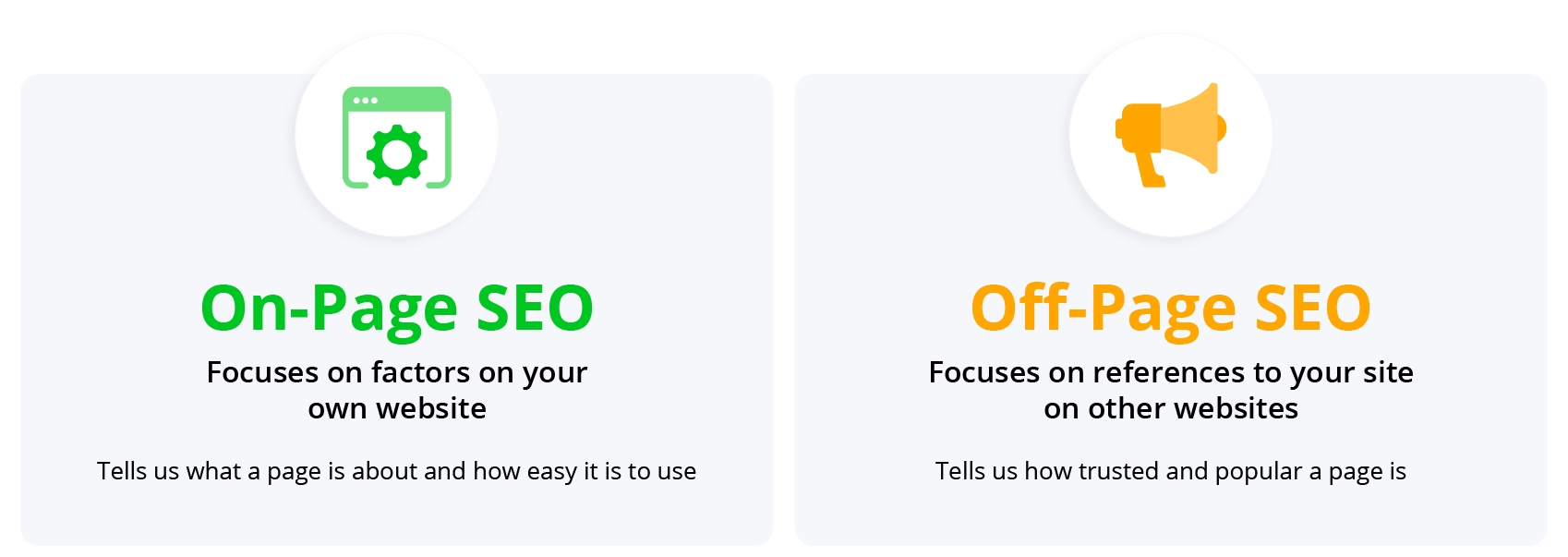
Differences Between On-Page and Off-Page SEO
On-Page SEO and Off-Page SEO are both crucial for website optimisation, but they focus on different aspects. Here's a simplified breakdown of their differences:
On-Page SEO is all about what's on your website. It involves making your site more search engine-friendly by using the right keywords and content. This includes optimising elements such as titles, meta descriptions, headers, URLs, and images. The goal is to help search engines understand your content and improve your visibility in search results. The best part is that you have complete control over the elements on your website, from the content you publish to the site structure.
Off-Page SEO, on the other hand, focuses on how your website is perceived by others. It's all about building a strong online reputation and credibility. Key elements include backlinks from other websites, social signals like likes and shares, brand mentions, guest posting, and local SEO. Unlike On-Page SEO, you don't have full control over Off-Page SEO, as it involves working with others and building relationships. However, Off-Page SEO is essential for building your website's authority and trustworthiness, leading to higher search rankings.
Why You Need Both On-Page and Off-Page SEO?
In essence, On-Page SEO is about perfecting your website's content and structure, while Off-Page SEO is about building a strong online presence and reputation. Both are vital for a successful SEO strategy.
Having great content (On-Page SEO) is essential, but it's not enough if no one is aware of it (Off-Page SEO). Conversely, attracting people to your site doesn't mean much if they find the content lacking or hard to navigate (poor On-Page SEO).
By striking a balance between these two strategies, you create a website that's not only appealing to visitors but also highly visible in search engine results. So, it's crucial to prioritise both On-Page and Off-Page SEO efforts to achieve a successful online presence.
Final Thoughts
Successfully navigating the digital landscape requires a comprehensive and balanced SEO approach that combines both On-Page and Off-Page strategies. On-Page SEO allows you to create a user-friendly and search engine-friendly website, while Off-Page SEO helps you build a strong online reputation and authority. Remember, SEO is an ongoing process, so stay informed about the latest trends and continuously optimize your website to achieve long-term success.
Explore More SEO Insights
Want to dive deeper into the world of SEO? We have a library of informative blogs that will provide you with actionable insights and strategies to help you enhance your entire SEO strategy. Check out these must-read posts:
Let these resources guide you in maximising your website's visibility, driving organic traffic, and achieving long-term SEO success.




